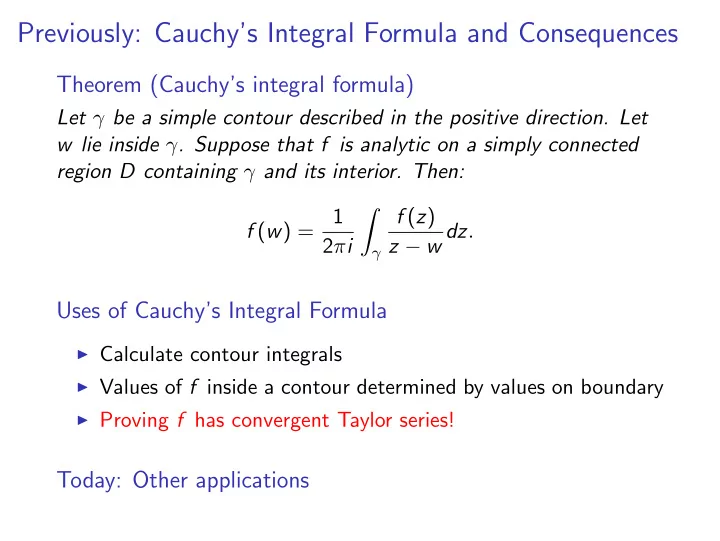

Previously: Cauchy’s Integral Formula and Consequences Theorem (Cauchy’s integral formula) Let γ be a simple contour described in the positive direction. Let w lie inside γ . Suppose that f is analytic on a simply connected region D containing γ and its interior. Then: 1 � f ( z ) f ( w ) = z − w dz . 2 π i γ Uses of Cauchy’s Integral Formula ◮ Calculate contour integrals ◮ Values of f inside a contour determined by values on boundary ◮ Proving f has convergent Taylor series! Today: Other applications
Analytic functions have all derivatives! Theorem (Cauchy’s Integral formula for the derivatives) Let γ be a simple contour described in the positive direction. let w be any point inside γ . Suppose f analytic on a simply-connected region D containing γ . Then f ( n ) ( w ) = n ! f ( z ) � ( z − w ) n +1 dz 2 π i γ Proof. d Take dw of both sides of CIF. Differentiate inside the integral. Example Let γ be the square with vertices 1 , i , − 1 , − i . Evaluate e z � z n dz γ
Another application of CIF: Liouville’s Theorem Theorem (Liouville’s Theorem) A function which is analytic and bounded in the complex plane is a constant. Proof. Let a , b ∈ C . 1. Rewrite f ( a ) − f ( b ) as an integral around | z | = R using CIF. 2. Use ML to bound | f ( a ) − f ( b ) | 3. As R → ∞ , the bound goes to 0. Toy applications of Liouville’s Theorem frequently on exam, and in problem sheets. More excitingly, Liouville’s Theorem can prove the fundamental theorem of algebra.
Hope you’re excited as I am
A theorem you’ve long used... Theorem (Fundamental Theorem of algebra) Let p ( z ) be a non-constant polynomial with complex coefficients. Then there is a point w ∈ C such that p ( w ) = 0 . Proof. Suppose not, and p ( z ) has no roots. Then show 1 / p ( z ) is bounded and analytic on C , and apply Liouville’s Theorem. Using induction, it follows that a polynomial of degree n has n roots, counted with multiplicity. Note The trick of dividing by a nonzero function appears frequently in applications.
Recommend
More recommend